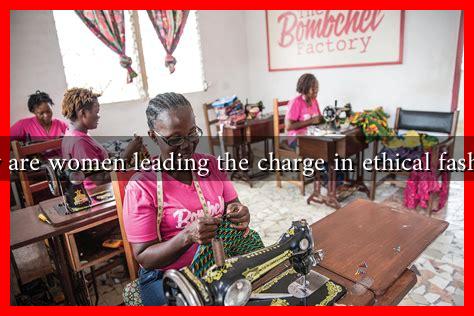-
Table of Contents
Why Are Women Leading the Charge in Ethical Fashion?
In recent years, the fashion industry has witnessed a significant shift towards sustainability and ethical practices. Women have emerged as key players in this movement, driving change and innovation in a sector often criticized for its environmental and social impacts. This article explores the reasons behind this trend, highlighting the contributions of women in ethical fashion and the broader implications for the industry.
The Rise of Ethical Fashion
Ethical fashion refers to clothing and accessories produced in a way that prioritizes environmental sustainability, fair labor practices, and social responsibility. As consumers become more aware of the negative impacts of fast fashion, the demand for ethical alternatives has surged. Women, who make up a significant portion of the fashion consumer base, are at the forefront of this movement.
Women as Key Consumers and Influencers
Women are not only the primary consumers of fashion but also influential figures in shaping trends and values. Their preferences and purchasing decisions have a profound impact on the industry. Here are some reasons why women are leading the charge in ethical fashion:
- Empathy and Social Responsibility: Women often exhibit higher levels of empathy and social consciousness, driving them to seek out brands that align with their values.
- Community Engagement: Women are more likely to engage in community initiatives and support local artisans, fostering a sense of connection and responsibility.
- Advocacy and Activism: Many women are vocal advocates for social and environmental issues, using their platforms to raise awareness and promote ethical practices.
Trailblazing Women in Ethical Fashion
Numerous women have made significant contributions to the ethical fashion movement, serving as role models and leaders. Here are a few notable examples:
- Stella McCartney: A pioneer in sustainable luxury fashion, McCartney has consistently championed cruelty-free practices and eco-friendly materials in her collections.
- Emma Watson: The actress and activist has used her influence to promote sustainable fashion, launching the #FashionRevolution campaign and advocating for ethical brands.
- Rei Kawakubo: The founder of Comme des Garçons, Kawakubo has pushed the boundaries of fashion while emphasizing the importance of craftsmanship and sustainability.
Statistics Highlighting Women’s Impact
The impact of women in ethical fashion is not just anecdotal; it is backed by statistics that illustrate their influence:
- According to a 2021 survey by McKinsey, 67% of women consider sustainability when making fashion purchases.
- A report from the Ethical Fashion Forum found that women-led brands are 50% more likely to prioritize ethical practices compared to their male counterparts.
- The Global Fashion Agenda’s 2022 report indicated that women are more likely to support brands that promote gender equality and fair labor practices.
The Future of Ethical Fashion
As the ethical fashion movement continues to grow, women will play an increasingly vital role in shaping its future. Their leadership is essential for driving innovation, fostering collaboration, and advocating for systemic change within the industry. Here are some trends to watch:
- Increased Representation: More women are entering leadership positions within fashion brands, bringing diverse perspectives and values to the forefront.
- Collaboration and Community: Women-led initiatives are fostering collaboration among brands, consumers, and activists to create a more sustainable fashion ecosystem.
- Education and Awareness: Women are leading educational campaigns to inform consumers about the importance of ethical fashion and how to make responsible choices.
Conclusion
Women are undeniably leading the charge in ethical fashion, driven by their values, influence, and commitment to social and environmental responsibility. As consumers, advocates, and leaders, they are reshaping the industry and paving the way for a more sustainable future. The rise of ethical fashion is not just a trend; it is a movement that reflects a deeper societal shift towards accountability and compassion. By supporting women-led initiatives and ethical brands, consumers can contribute to this positive change and help redefine the future of fashion.
For more insights on ethical fashion, visit Fashion Revolution.


